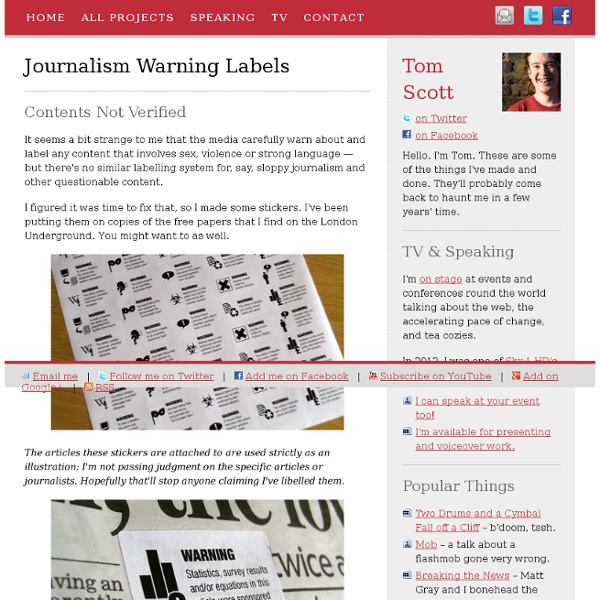Journalism Warning Labels & Tom Scott

Medieval Sourcebook
Update Information 2006: In 2006 the Internet Medieval Sourcebooks and associated sourcebooks are undergoing a major overhaul to remove bad links and add more documents. 2. This project is both very large and fairly old in Internet terms. At the time it was instigated (1996), it was not clear that web sites [and the documents made available there] would often turn out to be transient. As a result there is a process called "link rot" - which means that a "broken link" is a result of someone having taken down a web page. 2. 3. Note: This site aims to present medieval sources. Sourcebook Contents The Internet Medieval Sourcebook is organized as three main index pages, with a number of supplementary documents. Selected Sources This is the main entry to the resources here. Full Text Sources Full texts of medieval sources arranged according to type. Saints' Lives Devoted to Ancient, Medieval and Byzantine hagiographical sources. Supplementary Documents Help! Internet Sourcebook: Multimedia
Otomata
New! If you like Otomata, check out my new instrument Circuli by clicking here! Update: Click here to get Otomata for your iPhone / iPod / iPad! Official facebook page: Also this reddit page has many examples: And there is a subreddit for Otomata: Otomata is a generative sequencer. Each alive cell has 4 states: Up, right, down, left. at each cycle, the cells move themselves in the direction of their internal states. This set of rules produces chaotic results in some settings, therefore you can end up with never repeating, gradually evolving sequences. If you encounter something you like, just press “Copy Piece Link” and save it somewhere, or better, share it! Here is something from me to start with: Here is an action video: Edit: Woah so this has become famous! Here are replies to some common questions: Q: Will you add feature X?
Lisa Gold: Research Maven
aM laboratory
OFFF 2009 | Sponsor Titles - Onesize Motion Direction Design
Client: OFFF 2009 Created Icw: Craque Date: April 2009 Role: Concept, Direction, Production Audio: Jeff Dodson Format: SD Widescreen Length: 8 Min.12 Sec. Download: still to come Info: 36 Logo's, 4 weeks for concepting, pre- and postproduction .... This 8 Minute long short, was actually meant to be 4 minutes in length. The challenge here was to tell a story which would, in a fun kind of way, show the audience38 logo's wrapped in this years' theme "Failing Gracefully". In design, we fail gracefully all the time. But in the end Zlad manages to "create" something that satisfies him by accident, but still needs a little tweak Zlad Klitschko; "Good enough, just a little tweak and I am done..."
Related:
Related:



